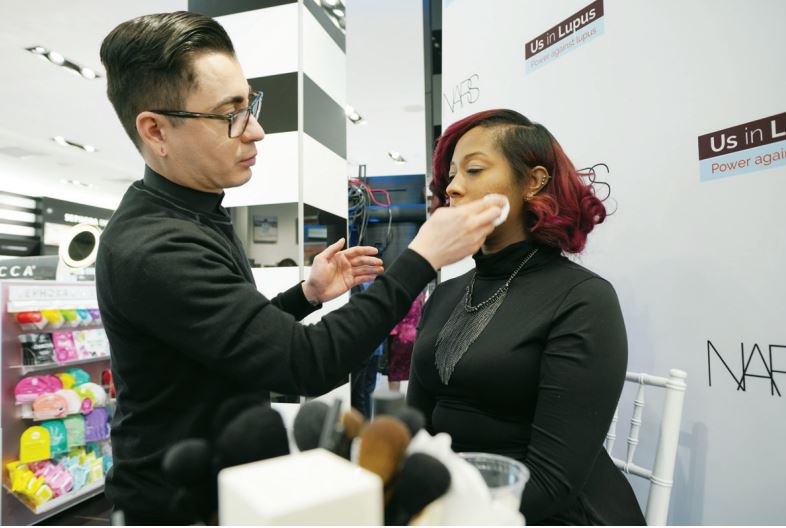[ad_1]
By George Kevin Jordan, AFRO Staff Writer
Lupus is impacting African American women at disproportionate rates than white women. According to data from the CDC, women ages 15 to 44 are at the greatest risk of developing lupus — African American women being 2-3 times more likely than Caucasian women.
GlaxoSmithKline (GSK) and global beauty brand NARS Cosmetics hosted a “Night of Beauty.” last week at Sephora inside Pentagon City Mall. The event was activated to empower women with educational resources about the disease as well as have hands on conversations with makeup consultants from NARS.

“One of our goals as an organization is to reduce health care disparities,” said Carla Pearson, vice president of Specialty Marketing at GSK. We know that in the case of lupus, lupus disproportionately impacts African-American women and also disproportionately impacts women of color so we’ve got a great resource that we call UsinLupus which really is about empowering patients to better understand their disease so that they can advocate when it comes to having conversations with their providers.
“So specific to women of color we’ve been on a journey to really understand and figure out better ways to communicate. So what we’ve uncovered and why we’re doing a ‘Night of Beauty’ is that we know that lupus can impact skin and can have an impact on an individual’s self-confidence. So what we’re trying to do is really raise and boost self confidence because we know that a more confident patient will do a better job of advocating for herself,” Pearson said in a statement.
“We also know that it’s important to not only educate the patients, but also educate the village surrounding the patients which is why we allow the patients to bring at least one individual with them to the program,” Pearson added.
Lupus is defined by the Lupus Foundation of America as a “chronic autoimmune disease that can damage any part of the body (skin, joints, and/or organs). “Chronic” means that the signs and symptoms tend to last longer than six weeks and often for many years.”
About 5 million people are impacted by Lupus globally, according to the LFA site. About 16,000 new cases are reported each year and about one in 537 African American women are diagnosed with Lupus.
Dr. Donald Thomas, a board certified rheumatologist in Prince George’s County, who came to the event to help patients educate themselves about Lupus, told the AFRO that lupus is extremely prevalent in the African-American community, but is not as publicized as other diseases.
“Lupus is more common than cystic fibrosis, leukemia, lymphoma, and multiple sclerosis,” Dr. Thomas said. “But we don’t seem to have people publicizing to the public as much as they should.”
He pointed to celebrities like Selena Gomez, Nick Cannon and Toni Braxton’s public battle with the disease help to shed light and publicity lupus.
Sydney Evans, a 33-year-old Maryland resident attended the event. She told the AFRO she was diagnosed with Lupus in November of 2017. “It still feels pretty new, so I am still adjusting and learning,” Evans admitted.
Early on Evans would experience a variety of symptoms, but as a project manager by day, cake artist by night and entrepreneur she said, “I’m always going, going, going, so for a few years I think I just thought I was doing too much and I just needed to rest.”
Evans said she ignored some of the symptoms, and when she did go to the doctor with say chest pains, the doctor would say they were heart palpitations. “No one really connected the dots,” Evans said.
After securing steady health insurance, she found a doctor who was as straightforward as she was, and administered a series of tests. Evans found out she had SLE, which is one of the most common forms of Lupus Now Evans is a strong proponent for self-advocacy and empowerment.
“I would definitely say we have to advocate for ourselves,” Evans said. “No one is going to know what we’re feeling inside. One of the things with lupus they call it the invisible disease it’s really difficult to pinpoint how your feeling just by looking at you.. So we have to really advocate for ourselves and feel confident to talk to our doctors and know that we’re not crazy when we’re saying we just can’t get out of the bed.”
GSK has created several online tools to help answer questions for people looking to understand the disease as well as lupus “warriors” who need more resources. For more information please go to UsinLupus.com.
[ad_2]
Source link
